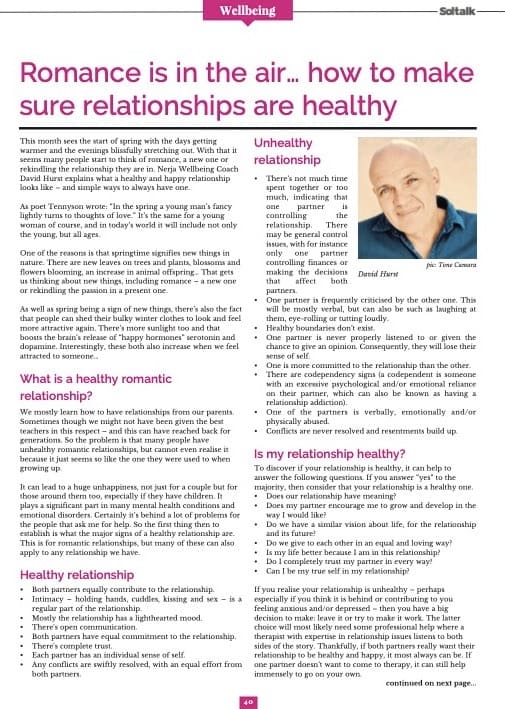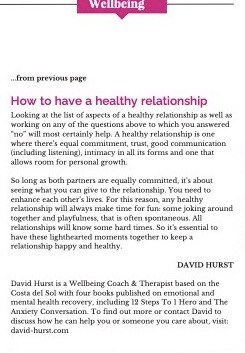Romance is in the air… how to make sure relationships are healthy

As poet Tennyson wrote: “In the spring a young man’s fancy lightly turns to thoughts of love.” It’s the same for a young woman of course, and in today’s world it will include not only the young, but all ages.
One of the reasons is that springtime signifies new things in nature. There are new leaves on trees and plants, blossoms and flowers blooming, an increase in animal offspring… That gets us thinking about new things, including romance – a new one or rekindling the passion in a present one.
As well as spring being a sign of new things, there’s also the fact that people can shed their bulky winter clothes to look and feel more attractive again. There’s more sunlight too and that boosts the brain’s release of “happy hormones” serotonin and dopamine. Interestingly, these both also increase when we feel attracted to someone…
What is a healthy romantic relationship?
We mostly learn how to have relationships from our parents. Sometimes though we might not have been given the best teachers in this respect – and this can have reached back for generations. So the problem is that many people have unhealthy romantic relationships, but cannot even realise it because it just seems so like the one they were used to when growing up.
It can lead to a huge unhappiness, not just for a couple but for those around them too, especially if they have children. It plays a significant part in many mental health conditions and emotional disorders. Certainly it’s behind a lot of problems for the people that ask me for help. So the first thing then to establish is what the major signs of a healthy relationship are. This is for romantic relationships, but many of these can also apply to any relationship we have.
Healthy relationship
- Both partners equally contribute to the relationship.
- Intimacy – holding hands, cuddles, kissing and sex – is a regular part of the relationship.
- Mostly the relationship has a lighthearted mood.
- There’s open communication.
- Both partners have equal commitment to the relationship.
- There’s complete trust.
- Each partner has an individual sense of self.
- Any conflicts are swiftly resolved, with an equal effort from both partners.
Unhealthy relationship
- There’s not much time spent together or too much, indicating that one partner is controlling the relationship. There may be general control issues, with for instance only one partner controlling finances or making the decisions that affect both partners.
- One partner is frequently criticised by the other one. This will be mostly verbal, but can also be such as laughing at them, eye-rolling or tutting loudly.
- Healthy boundaries don’t exist.
- One partner is never properly listened to or given the chance to give an opinion. Consequently, they will lose their sense of self.
- One is more committed to the relationship than the other.
- There are codependency signs (a codependent is someone with an excessive psychological and/or emotional reliance on their partner, which can also be known as having a relationship addiction).
- One of the partners is verbally, emotionally and/or physically abused.
- Conflicts are never resolved and resentments build up.
Is my relationship healthy?
To discover if your relationship is healthy, it can help to answer the following questions. If you answer “yes” to the majority, then consider that your relationship is a healthy one.
- Does our relationship have meaning?
- Does my partner encourage me to grow and develop in the way I would like?
- Do we have a similar vision about life, for the relationship and its future?
- Do we give to each other in an equal and loving way?
- Is my life better because I am in this relationship?
- Do I completely trust my partner in every way?
- Can I be my true self in my relationship?
If you realise your relationship is unhealthy – perhaps especially if you think it is behind or contributing to you feeling anxious and/or depressed – then you have a big decision to make: leave it or try to make it work. The latter choice will most likely need some professional help where a therapist with expertise in relationship issues listens to both sides of the story. Thankfully, if both partners really want their relationship to be healthy and happy, it most always can be. If one partner doesn’t want to come to therapy, it can still help immensely to go on your own.
How to have a healthy relationship
Looking at the list of aspects of a healthy relationship as well as working on any of the questions above to which you answered “no” will most certainly help. A healthy relationship is one where there’s equal commitment, trust, good communication (including listening), intimacy in all its forms and one that allows room for personal growth.
So long as both partners are equally committed, it’s about seeing what you can give to the relationship. You need to enhance each other’s lives. For this reason, any healthy relationship will always make time for fun: some joking around together and playfulness, that is often spontaneous. All relationships will know some hard times. So it’s essential to have these lighthearted moments together to keep a relationship happy and healthy.


My latest article for Soltalk: http://www.soltalk.com/comment/march-2022/
